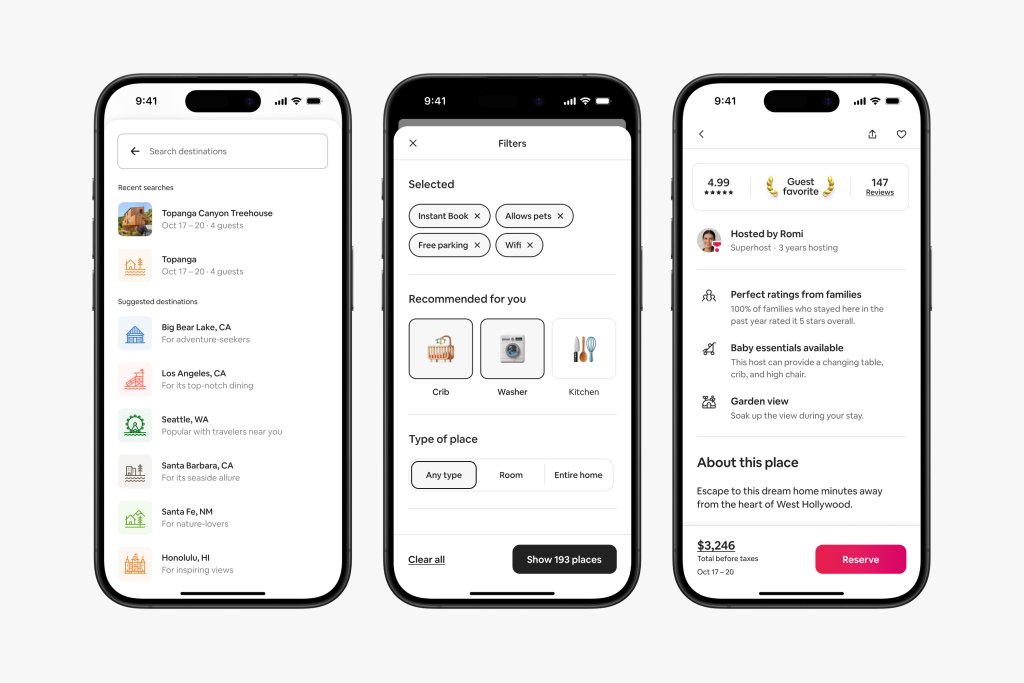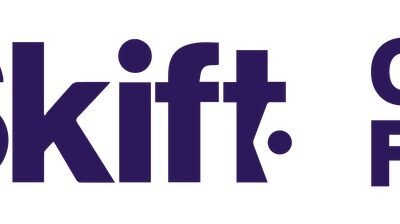AI in Travel
AI Is a Game Changer for TraveI Startups — Amex Ventures Exec

AI isn’t just reshaping the travel industry — it’s also unlocking new opportunities for startup founders to innovate and scale faster, said Kevin Tsang, managing director of Amex Ventures, the investment arm of American Express.
Tsang said on the Skift Travel Podcast that he believes startup founders “are able to do a lot more with less now.”
“You can imagine manual tasks that can be done much more efficiently. So if you had an idea before that was difficult to scale because there was this semi-manual component, this kind of opens up the aperture,” he said, adding he sees a lot of “excitement” surrounding the tools that can turn ideas into working prototypes.
Tsang joined American Express in 2011 and Amex Ventures has invested in more than 100 companies, including travel brands Mindtrip, Superlogic, and Boom Supersonic.
Listen Now
🎧 Subscribe
Apple Podcasts | Spotify | YouTube | RSS
Tsang provided Mindtrip as one example of the “with a blank slate approach.”
“(Mindtrip executives)” said, ‘If you were going to build a travel planning platform today and you knew you had these tools, what would you do?’ And I think for us, that was a really compelling vision,” Tsang said. “They’re continuing to find new ways to experiment with AI and the tools that might be needed for it.”
Tsang cited Mindtrip’s “Start Anywhere,” a feature that can build an itinerary from any point of inspiration — such as a screenshot, a URL, or even a post on social media — noting that AI is increasingly intersecting with social commerce and creator-driven inspiration.
He also addressed Amex Ventures’ investment in Boom Supersonic, a company back in the spotlight after the U.S. government recently cleared supersonic flights over the U.S.
“You can kind of see why we were drawn to the future of travel that they were kind of exhibiting,” Tsang said.
Understanding Why People Are Traveling
Tsang explained it’s important to understand why travel people are traveling.
“We often talk about recommendations to people, but if you don’t know why someone is going on a trip, it’s actually a big limiting factor in how you do that. And so, you might know someone’s travel profile and how they like things,” he said.
“But if you’re going to recommend someone on a business trip versus their honeymoon versus a wellness (trip) … it’s actually a really interesting and compelling data point …”
Dealing With ‘the Big Boys’
When asked about the role companies like Marriott, Booking.com, and Google would play in startups — as partners, acquirers, or even competitors — Tsang highlighted the benefits of partnerships.
“There’s a lot of things in the travel sector that work and don’t need to be recreated. So I wouldn’t want a startup to go out and do that,” Tsang said.
“So that’s where partnerships or different types of collaboration will become. The startups are going to be able to focus on the net new things with extreme focus that hopefully will be complimentary to some of these big players.”
The travel industry’s top event returns this fall.
September 16-18, 2025 – NEW YORK CITY
AI in Travel
Commentary: Will AI help or wreck your next holiday?

TOKYO: On a recent trip to Taiwan, I turned to ChatGPT to ask for recommendations for the best beef noodles in my area – with the very specific request that the shop had to accept credit cards, as I was running low on my stash of local currency.
The chatbot immediately recommended a place that was a short walk and featured some of the most delicious, melt-in-your mouth beef tendon I’ve ever had. I was pleased to be the only foreigner in the no-frills, no air-conditioning joint that was home to a fat, orange cat taking a nap under one of the metal stools. But after my meal, I panicked when the impatient woman behind the counter had to put aside the dumplings she was folding to try and communicate in English to me that it was cash only.
Even a quick Google search of the hole in the wall would’ve saved me from this fate, and I felt foolish for blindly trusting the AI’s outputs.
Talking to other travellers, I realised I was lucky that the restaurant existed at all, hearing stories of AI tools sending confused tourists to places that were closed or not even real.
Still, I found the tool incredibly helpful while navigating a foreign city, using it not just to find spots to eat but also to translate menus and signs, as well as communicate with locals via voice mode. It felt like the ultimate Asia travel hack.
AI in Travel
Ansett Australia is back as an AI-based travel agency

Acquiring the Ansett brand was relatively straightforward, Frantzeskos said. The trademark had lapsed, and the domain name www.ansett.travel was also available for purchase. He’s confident that despite the painful downfall, there are many Australians – particularly those aged 35 and above – with fond memories of the airline.
“It’s a shame it went away, but I think that brand voice is still compelling, and people have nostalgia for it,” Frantzeskos said. “Just because the corporate entity behind something didn’t work doesn’t mean that the brand still doesn’t mean something. When I mention what I’m doing to people, they get a big smile on their face.”
Frantzeskos, a digital marketing veteran, has worked with Emirates, Saudi Tourism and Dubai Tourism as clients and said that experience will help deliver compelling customer experiences with Ansett. He has partnered with Melbourne-based travel start-up Travlr, which is providing the platform’s technical back-end and customer support infrastructure.
A screenshot of the Ansett Travel website.Credit:
While many of the AI features are yet to be built out, the entrepreneur said he eventually wants to provide travel experiences for customers that would be possible only with AI. For now, customers can book at near-wholesale prices on flights and accommodation and pay a $99 yearly fee for VIP membership.
Loading
“One thing I’m hoping to do is, if you’ve booked a holiday for your family, we’ll know who you are and your name and where you’re going, so I want to give you an AI-written jingle and send it to you so it can be the soundtrack of your holiday,” he said.
“I’m a big believer that you don’t need armies of people out there doing stuff that can be done better with AI. And the cost of implementation is really declining so much – you don’t need thousands of staff and to train them any more. With AI, you can just get going straight away.
“I think there are new, cool, fun experiences we can do what would never be achievable by humans.”
He added that, eventually, he believed people wouldn’t have to search or plan holidays at all.
“Your travel concierge will know when the kids are on school holidays, or when you need a break, and quietly offer the perfect trip. It’s not about replacing people – it’s about anticipating and tailoring times when we want to have fun or disconnect.”
The Business Briefing newsletter delivers major stories, exclusive coverage and expert opinion. Sign up to get it every weekday morning.
AI in Travel
What if Airbnb Builds the Killer AI Travel Search App?

Airbnb is preparing to rebuild its internal search engine with generative AI at the core. In a recent job posting for a search infrastructure engineer, the company outlined plans for a “next generation search platform” designed to support “generative AI (large language model) use cases.”
Candidates with expertise in search and recommendation systems are encouraged to apply, and experience with GenAI or LLMs is listed as a preferred qualification.
Search is one of the most critical components of Airbnb’s business. It determines how guests discover homes and experiences, and how hosts reach customers. And while Airbnb has not made any public announcements about an AI-native search product, the technical scope and job description point to ambitions beyond incremental improvements.
The listing suggests Airbnb is looking to reconstruct its core search product to accommodate AI. The new platform is described as one that will “power different products at Airbnb,” suggesting that generative AI could become a foundational layer across the company’s marketplace.
In response to a request for comment, an Airbnb spokesperson said the company is “always working to enhance the overall Airbnb experience” and is “actively seeking talented individuals who share our mission to transform the way people travel.”
Give Me a Room With a View
If Airbnb succeeds in launching a functional AI-powered search system, the move could change how travelers interact with the platform. Traditional travel search engines rely on structured inputs: location, dates, price filters, and a fixed set of amenities. Generative AI has the potential to interpret natural language queries, understand user context, and return relevant results with fewer steps and less manual sorting.
For example, instead of filtering by location and bedroom count, a guest might enter a query such as “a quiet place in the mountains with fast Wi-Fi, a hot tub, and a view” – and receive listings that match even if the keywords don’t align exactly.
Several other travel companies have begun integrating AI tools into their platforms, including chat-based trip planning assistants and personalization features.
When Data is King
But Airbnb may be in a stronger position than some of its competitors to make that shift. The company has access to a large volume of structured and unstructured data: millions of listings with detailed attributes, user-generated reviews, booking behavior, search history, and messaging between hosts and guests. This data could support the training or fine-tuning of models capable of delivering more personalized and accurate search outcomes.
Airbnb also owns its entire supply-side platform. Unlike online travel agencies that depend on inventory from third-party providers and hotel chains, Airbnb’s listings are user-generated and directly managed on its system. That vertical integration provides a cleaner dataset and more flexibility in how results are ranked and surfaced, key advantages for any machine learning application.
The introduction of a new AI-native search system could also create competitive pressure in the broader travel sector. Google, Booking Holdings, and Expedia Group have all made recent announcements about generative AI experiments, including itinerary generation and trip planning tools.
Airbnb CEO Brian Chesky has previously hinted at AI’s potential role in product discovery, referring in past earnings calls to a vision of Airbnb as a kind of intelligent travel concierge. A generative AI system could take that vision further, allowing for contextual, conversational discovery that adapts to different user intents in real time.
The company has not disclosed what timeline it is working toward, what specific models it may be using, or whether it intends to partner with external AI vendors or develop proprietary solutions. The job posting does not mention OpenAI, Anthropic, Google, or any of the major LLM providers by name.
Beyond the Short-Term Rental
What if Airbnb is thinking bigger than site search? There’s a huge world of travel beyond short-term rental listings and its new experiences product.
Airbnb’s focus on design and its ability to attract talent put it in a position to compete in ways that other travel brands can’t.
Chesky also has a strong relationship with Sam Altman, CEO of OpenAI. They’ve known each other since the 2000s, first at Y Combinator, the startup accelerator. And Altman has talked about the counsel Chesky gave him at OpenAI.
Airbnb has always had ambitions beyond booking a room, and the focus on AI search will help it compete against players like Expedia when it comes to airline search or any other part of the travel journey.
-

 Brand Stories7 days ago
Brand Stories7 days agoBloom Hotels: A Modern Vision of Hospitality Redefining Travel
-

 Brand Stories2 days ago
Brand Stories2 days agoCheQin.ai sets a new standard for hotel booking with its AI capabilities: empowering travellers to bargain, choose the best, and book with clarity.
-

 Destinations & Things To Do1 week ago
Destinations & Things To Do1 week agoUntouched Destinations: Stunning Hidden Gems You Must Visit
-

 AI in Travel1 week ago
AI in Travel1 week agoAI Travel Revolution: Must-Have Guide to the Best Experience
-

 Brand Stories3 weeks ago
Brand Stories3 weeks agoVoice AI Startup ElevenLabs Plans to Add Hubs Around the World
-

 Brand Stories2 weeks ago
Brand Stories2 weeks agoHow Elon Musk’s rogue Grok chatbot became a cautionary AI tale
-

 Destinations & Things To Do2 days ago
Destinations & Things To Do2 days agoThis Hidden Beach in India Glows at Night-But Only in One Secret Season
-

 Asia Travel Pulse3 weeks ago
Asia Travel Pulse3 weeks agoLooking For Adventure In Asia? Here Are 7 Epic Destinations You Need To Experience At Least Once – Zee News
-

 AI in Travel3 weeks ago
AI in Travel3 weeks ago‘Will AI take my job?’ A trip to a Beijing fortune-telling bar to see what lies ahead | China
-

 Brand Stories3 weeks ago
Brand Stories3 weeks agoChatGPT — the last of the great romantics












